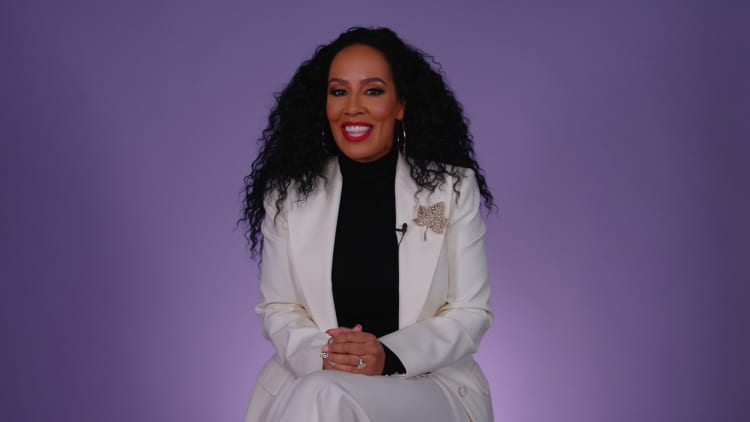In the past decade, AT&T grew just 71% in market valuation compared with Netflix's explosive growth of more than 4,000%. But it's still one of the world's largest telecommunication companies, and despite it's slower growth, At&T has proven to be a positive bet for investors.
Those who invested in AT&T 10 years ago would have earned a healthy return. A $1,000 investment in 2009 would be worth nearly $2,400 as of Dec. 30. 2019, for a total return of 140%. AT&T's current share price is hovering around $39.
While an investment in AT&T would have earned you a profit, you would have been better off buying a low-cost index fund that tracks the market, since the shares underperformed the return of the S&P 500. In the same time frame, the S&P 500 had a total return of around 255%.
Past returns do not predict future results.
CNBC: AT&T's stock as of December 2019.
Now a booming media company, AT&T has made big business moves and faced significant challenges in recent years.
In an attempt to expand its reach, AT&T acquired satellite television operator DirecTV in 2015 for $67 billion. Since then, AT&T has bundled DirecTV's services with its own in an effort to offer AT&T users a wider range of broadband internet and cellphone service offerings. Despite the fact that millions have canceled their DirecTV service since 2016, AT&T CEO John Stankey says the company isn't planning on selling the TV company — especially since DirecTV makes up a good portion of AT&T's advertising business and provides the company with useful data when it comes to targeting ads.
In 2018, AT&T acquired Time Warner, nearly two years after it had first announced plans to buy the mass media and entertainment conglomerate for $85.4 billion. For a while, though, it looked like the deal might not go through after the Department of Justice sued to block the merger in November 2017, citing claims that AT&T might try to charge competing distributors higher prices for Time Warner content.
AT&T, however, won the case in June 2018 after a federal judge declared the purchase legal and did not impose conditions on the merger's approval, giving AT&T permission to proceed. Although news that AT&T won the case drove its shares down 2%, it boosted Time Warner shares 5% in extended trading on June 12, 2018.
That wasn't AT&T's first dispute with federal officials: In 2015, the company faced public backlash after it reached a $25 million settlement with the Federal Trade Commission over data breaches at call centers in Mexico, Colombia and the Philippines. These breaches resulted in the unauthorized disclosure of names and full or partial Social Security numbers of 280,000 U.S. customers of AT&T.
Last November, the FTC determined that AT&T would have to pay $60 million to resolve government allegations that it had ripped off "unlimited" data plan users by slowing down their data speeds after they had used a certain amount. The money that AT&T is ordered to pay will be put into a fund that will provide partial reimbursement to current and former customers who signed up for unlimited plans before 2011 but had their data speeds lowered after their use exceeded a certain amount.
AT&T's stock performance
AT&T stock has been a steady choice through the years. Still, like most public companies, it's seen its fair share of ups and downs.
As of October 2018, AT&T had seen its worst year since the 2008 financial crisis with stocks down more than 20% for the year. It was partly due to its lagging wireless business and because of its multimillion-dollar media bet in DirecTV in 2014 that failed to pay off.
In 2019, the telecommunications business' stock has been on the mend, and shares have increased 40%.
However, last November, telecommunications industry analyst Craig Moffett downgraded AT&T's stock to a sell, saying AT&T's wireless business can't possible carry its other struggling segments in 2020.
Despite Moffett's sell recommendation, CNBC's Jim Cramer disagreed with the idea that investors should remove AT&T from their portfolios altogether.
On the Dec. 9, "Mad Money" show, Cramer said AT&T stock was still "investible" thanks to activist investor Elliott Management's large stake in the company.
What's next for AT&T
In addition to launching its 5G network last month, Stankey set a goal of getting 50 million HBO Max subscribers in the United States by 2025. HBO Max is AT&T's signature streaming service, priced at $14.99 a month.
To reach to this goal, AT&T is partnering with pay-TV distributors to grant current HBO subscribers access to HBO Max. AT&T is also offering HBO Max for free to all of its premium unlimited wireless customers, as well as, its top-tier home broadband subscribers.
In its predictions for next quarter, Bank of America said AT&T's stock can increase 10% due to earnings growth on its new, cost-cutting initiatives, plus the new Warner Brother's movie "Birds of Prey," which is slated to premier in February.
If you are considering getting into investing, start by sticking to the basics. "Develop an overall plan, keep expenses low, diversify, rebalance," David Wilson, a certified financial planner at Watts Capital in New York, told CNBC.
If going it alone feels too intimidating at first, Wilson suggests starting to invest with the help of a robo-advisor, which is a digital platform that provides automated, algorithm-driven financial advice at a low cost.
Here's a snapshot of how the markets look now.
Like this story? Subscribe to CNBC Make It on YouTube!
Don't miss:



